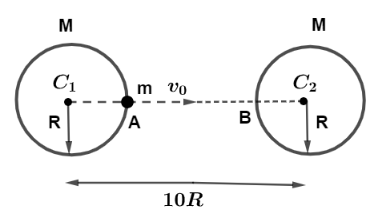Question
Question: Two large spherical objects of mass M each are fixed as shown in figure. A small point mass \(m\) is...
Two large spherical objects of mass M each are fixed as shown in figure. A small point mass m is projected from point A heading towards the centre C2 of the second sphere. The minimum velocity of point mass so that it can reach up to second object at point B is 3n5RGM then, calculate n (Neglect other Gravitational forces)

Solution
In order to solve the given question, we will use the concept of conservation of energy, in the given case we will neglect any other form of energy except gravitational potential energy and kinetic energy of point mass. We will find the minimum velocity of point mass m.
Formula used:
Conservation of energy which can be written as
(Gravitational Potential energy + Kinetic energy) at point A = (Potential energy + Kinetic energy) at point B.
Gravitational potential energy between two bodies is given by,
P.E=−RGM1M2
Kinetic energy of a body is written as K.E=21mv2.
Complete step by step answer:
From the given diagram we can see that, let us find the P.E(and)K.E at point A.
Since two spherical objects will have a potential energy of −10RGm2
Sphere B and point mass m will have a potential energy of −9RGMm
Sphere A and point mass m will have a potential energy of −RGMm
Kinetic energy of point mass at point A will be 21mv2
Now, total energy of the system at point A is the sum of all above energies, which can be written as
EA=−(10RGm2+9RGMm+RGMm)+21mv2
⇒EA=−10RGm2−9R10GMm+21mv2
Now, taking point B we will have, kinetic energy will be zero as point mass will came to rest only potential energy will act at point B will be due to point mass and other two spheres which we already found as;
Sphere B and point mass m will have a potential energy of −9RGMm
Sphere A and point mass m will have a potential energy of −RGMm
So, total energy at point B can be written as
EB=−9R10GMm
So, equate both equations EA=EB we get,
−10RGm2−9R10GMm+21mv2=−9R10GMm
⇒10RGm2=21mv2
⇒5RGm=v2
⇒v=5RGM
Compare this value with given relation 3n5RGM
So, 3n5RGM=5RGM
So, n=3
Hence, n=3 is the required value.
Note: It should be remembered that, as the point mass object reaches to the surface of another sphere at point B it will came to rest and hence its Kinetic energy is taken as zero whereas potential energy is always due to work done by the body against the gravity and hence always taken as negative.
